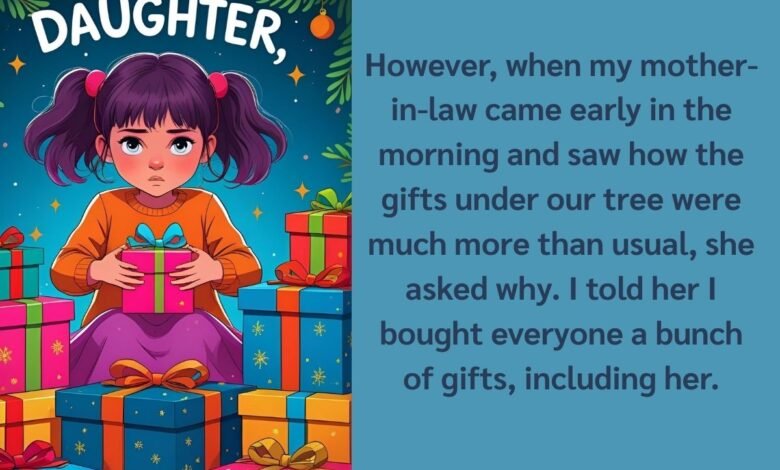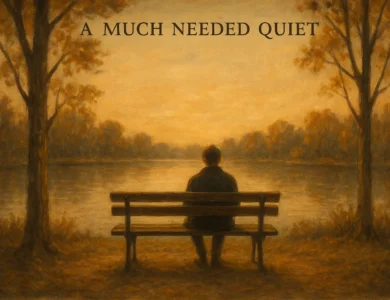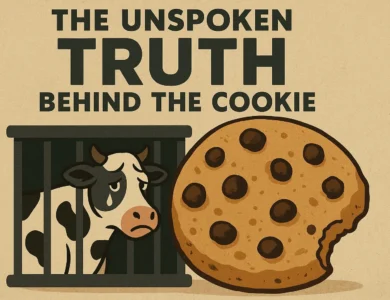
My mother-in-law showed up Christmas morning two hours early, uninvited, clutching a tin of her dry-ass cookies and her usual air of judgment. I tried to stay chill—it’s the holidays. Peace and joy, whatever.
She walked in, took one look at the tree, and narrowed her eyes. “Wow,” she said. “That’s… a lot of gifts.”
I told her, yeah, I went a little overboard this year. Everyone got something extra—including her.
She didn’t say thank you. Instead, she nodded toward my 10-year-old daughter, who was in her unicorn PJs, literally glowing with excitement, and said, “Well, I hope you didn’t spend that much on her. You know kids that spoiled grow up useless.”
Loud enough for my daughter to hear.
My husband froze. I waited. He said nothing.
So I smiled. Said, “Don’t worry, I definitely didn’t spend too much on her.”
And after she left the room to go “check the turkey,” I took her name off the biggest box under the tree and scribbled a new tag: To my daughter, from Santa—with extra love to make up for grandma.
She opened it right in front of her. A tablet. The exact one my mother-in-law had been hinting at for weeks.
My husband stared at me. My daughter squealed. And my mother-in-law—
She turned beet red. Her mouth opened, then closed, like a fish gasping for water. I swear, if she’d had pearls to clutch, she’d have yanked them right off her neck.
“I thought that one was mine,” she said finally, voice thin and icy.
“Oh, was it?” I said, feigning surprise. “Oh dear, I must’ve mixed up the tags. But, you know, Santa must’ve had his reasons.”
My daughter hugged the box like it held the moon and stars. “Thank you, Santa!” she cried. “This is the best Christmas ever!”
My mother-in-law’s face twitched. “Well, I suppose some people think a ten-year-old needs expensive electronics.”
“She’s top of her class,” I said. “Helps with chores. Kind to everyone. I think Santa made a solid investment.”
There was silence. Tense and sharp.
And then my husband finally spoke. “Mum,” he said, “can we not do this today?”
She didn’t answer. She just sat down on the edge of the couch, her tin of cookies still on her lap, unopened.
I wish I could say that was the end of it. That the point was made and we all moved on. But nope. Not with Sharon.
After dinner, while I was washing dishes, she cornered me in the kitchen.
“That was petty,” she hissed.
I turned off the faucet and dried my hands slowly. “Petty is telling a child they’re going to grow up useless.”
“She needs to hear the truth sometimes.”
“She’s ten.”
“Exactly. Better she hears it now.”
I could’ve exploded. Instead, I kept my voice low. “You’re not her parent, Sharon. You don’t get to discipline her with insults.”
She looked at me with pure disdain. “I don’t know what your problem is. I raised your husband just fine.”
I looked her dead in the eyes. “Then you should know how it feels to have your parenting undermined.”
She walked out without another word. And for the rest of the evening, she played the silent victim, sighing loudly and shaking her head anytime someone smiled too much or the dog barked too joyfully.
That night, after everyone left, my husband and I sat on the couch, finally alone.
“I’m sorry,” he said.
I was surprised. He rarely took sides.
“I should’ve said something earlier,” he continued. “She was out of line.”
“Thank you,” I said, honestly.
He looked at the tree, now a mess of ripped paper and half-empty boxes. “I think we need to set boundaries with her. For real this time.”
“I’ve been waiting for you to say that for years.”
And to his credit, he did.
Over the next few weeks, we started small. No more unannounced visits. No more backhanded comments allowed in front of our daughter. And if she couldn’t be respectful, she wouldn’t be invited.
You’d think that would be the end of it.
But no.
Sharon retaliated.
Not openly, of course. That’s not her style. Instead, she started a little whisper campaign with the extended family.
I started getting odd texts from cousins I hadn’t seen in years. Passive-aggressive messages like, “Hope you’re doing okay! Must be hard juggling everything without family support.”
Or, “Your MIL says you’ve been under a lot of stress lately. Want to talk?”
I ignored most of it. But one night, my sister-in-law forwarded me a screenshot.
It was from a family group chat I wasn’t part of. Sharon had written, “Some people think Christmas is about showing off. I pity the children caught in the middle.”
That was it.
I called her.
“Hi Sharon,” I said, calm and clear. “I saw what you wrote.”
She didn’t deny it.
“I’m not sure what you’re trying to achieve,” I said. “But if you’re trying to paint me as some kind of villain for protecting my kid, then go ahead. Just know I won’t let it affect her. Or us.”
She sniffed. “I don’t think you understand how family works.”
“I do. That’s why I’m protecting mine.”
And I hung up.
A few weeks passed. Then, something strange happened.
My daughter got a card in the mail. No return address, but the handwriting was familiar. Inside was a folded note and fifty dollars.
The note read: “I’m sorry. You are a good girl. Love, Grandma.”
I sat there, holding the note, unsure how to feel. My daughter read it, blinked, and said, “Can we send her one back?”
So we did. My daughter wrote, “Thank you, Grandma. I forgive you. Merry (late) Christmas.”
We mailed it together.
The next time Sharon came over, she brought actual food. A casserole. And she apologized. Not dramatically, but enough.
“I’ve been thinking,” she said quietly. “About how I talk to her. And to you.”
My husband stood beside me. I didn’t say anything. Just let the silence settle.
“I was raised different,” she continued. “But that doesn’t mean I was right.”
It wasn’t perfect. It wasn’t tearful or grand. But it was something. And sometimes, something is enough to start again.
Since then, she’s tried harder. Still has her moments, but they’re fewer. And when they happen, my husband doesn’t stay silent.
Our daughter still plays on that tablet. She’s used it for school, for reading, even made her first little digital drawing of our family—with Grandma in the corner, holding cookies.
And the caption? “Even when people mess up, they can still learn to be nice.”
That drawing’s on our fridge now. I see it every morning.
Some people think revenge has to be loud, or cruel. But sometimes, the best kind of justice is soft. Kind. Unmistakable.
That year, we didn’t just wrap presents.
We unwrapped truth.
We unwrapped growth.
And in a way, that little gift tag—“with extra love to make up for grandma”—did more than make a statement.
It cracked open something that had been closed off for years.
So if you’re dealing with someone who thinks your child doesn’t “deserve” love, respect, or gifts—remember this:
Kindness with a backbone is still kindness.
And boundaries, once drawn, can become bridges.
Have you ever had to stand up for your child in front of family? What happened after? Let me know in the comments—and if this story hit home, give it a like and share it with someone who needs to hear it.
Read More: WHEN I SAT DOWN ON THE PLANE







